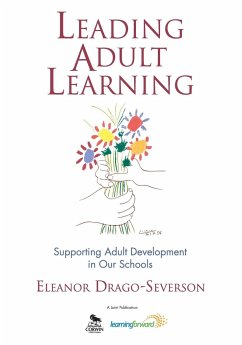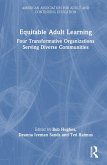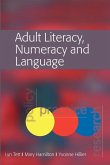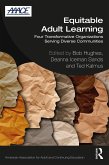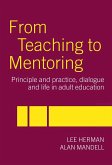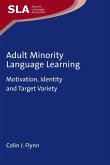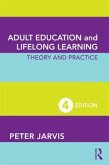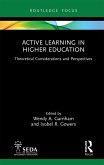- Broschiertes Buch
- Merkliste
- Auf die Merkliste
- Bewerten Bewerten
- Teilen
- Produkt teilen
- Produkterinnerung
- Produkterinnerung
This learning-oriented model of school leadership details four Pillar Practices for helping adults grow throughout their careers: teaming, providing leadership roles, collegial inquiry, and mentoring.
Andere Kunden interessierten sich auch für
![Equitable Adult Learning Equitable Adult Learning]() Equitable Adult Learning176,99 €
Equitable Adult Learning176,99 €![Adult Literacy, Numeracy and Language: Policy, Practice and Research Adult Literacy, Numeracy and Language: Policy, Practice and Research]() Lyn TettAdult Literacy, Numeracy and Language: Policy, Practice and Research39,99 €
Lyn TettAdult Literacy, Numeracy and Language: Policy, Practice and Research39,99 €![Equitable Adult Learning Equitable Adult Learning]() Equitable Adult Learning60,99 €
Equitable Adult Learning60,99 €![From Teaching to Mentoring From Teaching to Mentoring]() Lee HermanFrom Teaching to Mentoring52,99 €
Lee HermanFrom Teaching to Mentoring52,99 €![Adult Minority Language Learning Adult Minority Language Learning]() Colin J. FlynnAdult Minority Language Learning54,99 €
Colin J. FlynnAdult Minority Language Learning54,99 €![Adult Education and Lifelong Learning Adult Education and Lifelong Learning]() Peter Jarvis (UK University of Surrey)Adult Education and Lifelong Learning83,99 €
Peter Jarvis (UK University of Surrey)Adult Education and Lifelong Learning83,99 €![Active Learning in Higher Education Active Learning in Higher Education]() Active Learning in Higher Education51,99 €
Active Learning in Higher Education51,99 €-
-
-
This learning-oriented model of school leadership details four Pillar Practices for helping adults grow throughout their careers: teaming, providing leadership roles, collegial inquiry, and mentoring.
Hinweis: Dieser Artikel kann nur an eine deutsche Lieferadresse ausgeliefert werden.
Hinweis: Dieser Artikel kann nur an eine deutsche Lieferadresse ausgeliefert werden.
Produktdetails
- Produktdetails
- Verlag: SAGE Publications Inc
- Seitenzahl: 368
- Erscheinungstermin: 23. September 2009
- Englisch
- Abmessung: 254mm x 178mm x 20mm
- Gewicht: 704g
- ISBN-13: 9781412950725
- ISBN-10: 1412950724
- Artikelnr.: 26260122
- Herstellerkennzeichnung
- Libri GmbH
- Europaallee 1
- 36244 Bad Hersfeld
- gpsr@libri.de
- Verlag: SAGE Publications Inc
- Seitenzahl: 368
- Erscheinungstermin: 23. September 2009
- Englisch
- Abmessung: 254mm x 178mm x 20mm
- Gewicht: 704g
- ISBN-13: 9781412950725
- ISBN-10: 1412950724
- Artikelnr.: 26260122
- Herstellerkennzeichnung
- Libri GmbH
- Europaallee 1
- 36244 Bad Hersfeld
- gpsr@libri.de
Ellie Drago-Severson is Professor of Education Leadership and Adult Learning and Leadership at Teachers College, Columbia University. A developmental psychologist, Ellie teaches, conducts research, and serves as a consultant to school and district leaders, systems leaders, and teacher leaders in public, charter and private schools and systems-on professional and personal growth and learning; leadership that supports principal, teacher, school, and leadership development; and coaching and mentoring in K-12 schools, university settings, and other adult education contexts domestically and internationally. She is also an internationally certified developmental coach who works with leaders to build internal capacity, lead on behalf of social justice, and grow systemwide capacity. For more than three decades, Ellie's research, teaching, and partnerships in the field have sought-synergistically-to explore, and extend the possibilities of adult development and developmental leadership as levers for internal capacity building at the individual, team, organizational, and societal levels. Her work explores interconnected streams that focus on: the connection between internal capacities and educational leaders' practice on behalf of social justice, a developmental approach to feedback for growth, pressing challenges national and international educational leaders are facing and helping them to manage them, leadership preparation and development, a new, learning-oriented model for leadership development, supporting adult development in individuals and teams across and within systems, supporting diverse adult English Language Learners and those who serve them, and growing teacher leadership. Consonant with the urgent conversations about transforming schools, systems, and society as more learning- and equity-oriented contexts, her work foregrounds how we can support leaders' internal capacity building in schools, organizations, and leadership preparation programs, and how these capacities inform the gifts leaders are able to give to those in their care, each other, and the world as they lead for social justice. Ellie loves opportunities to accompany school leaders in their vital work-and never takes it for granted. Instead, she considers it a gift. At Teachers College, Ellie is director of the PhD Program in Educational Leadership, teaches aspiring and practicing principals in the Summer Principals Academy, aspiring superintendents in the Urban Educators Leaders Program, leaders from a variety of different sectors in the Accelerated Educational Guided Inquiry Studies (AEGIS) Program, and also coaches leaders in the Cahn Fellows Program for Distinguished Leaders and in her private coaching practice to help leaders grow their practice and themselves. She also serves as faculty director and co-facilitator of the Leadership Institute for School Change at Teachers College. Ellie is author of the best-selling books Helping Teachers Learn (Corwin, 2004) and Leading Adult Learning (Corwin/The National Staff Development Council, 2009)-as well as Becoming Adult Learners (Teachers College Press, 2004) and Helping Educators Grow (Harvard Education Press, 2012). She is also a co-author of Learning for Leadership (Corwin, 2013), Learning Designs (Learning Forward & Corwin, 2014), Tell Me So I Can Hear You (Harvard Education Press, 2016), and Leading change together (ASCD, 2018). Ellie's work has earned awards from the Spencer Foundation, the Klingenstein Foundation, and Harvard, where she served on faculty for 8 years and was awarded the Morningstar Award for Excellence in Teaching and the Dean's award for Excellent in Teaching. Most recently, Ellie received three outstanding teaching awards from Columbia University. She has earned degrees from Long Island University (BA) and Harvard University (EdM, EdD and Post-Doctoral Fellowship). Ellie grew up in the Bronx and is very grateful for the way in which it and that community has shaped her life.
Preface
Acknowledgments
About the Author
Part 1. Foundations
1. A New Model of Leadership for Adult Growth and Learning
In This Chapter
Meeting Adaptive Challenges
The Need for a New Model of Leadership
Supporting Learning Across the System
Re-envisioning Staff Development
The Research Informing This Book
A New Learning-Oriented Model of School Leadership
Organization of the Book
Summary and Conclusion
Reflective Questions
2. How Constructive-Developmental Theory Informs the Pillar Practices
Why Constructive-Developmental Theory?
Informational Learning vs Transformational Learning
Constructive-Developmental Theory: An Introduction
Why Ways of Knowing Matter When Supporting Adult Growth
Shaping School Cultures: Noble Expectations and Hidden Developmental
Demands
The Holding Environment and Why It Matters in Schools
The Learning-Oriented Leadership Model
Chapter Summary
Frequently Asked Questions
Application Exercise
Reflective Questions
Part 2. Pillar Practices for Growth
3. Teaming: Growth Opportunities for Individuals, Organizations, and
Systems
About Effective Teaming and Its Value
Key Elements of Successful Teaming
The Team as a Source of Individual Growth and Development
Why and How School Leaders Employ Teaming
Team Structures That Nurture Adult Development
Implementing Teaming: Lessons From the Field
Chapter Summary
Frequently Asked Questions
Application Exercise
Reflective Questions
4. Providing Leadership Roles: Learning and Growing From Leading Together
About Providing Leadership Roles
Developmental Benefits of Providing Leadership Roles
Examples of School Leaders? Use of Providing Leadership Roles
Cases and Lessons From the Field
Chapter Summary
Reflective Questions
5. Collegial Inquiry: Engaging in Shared Dialogue and Reflection on
Practice
Collegial Inquiry: A Kind of Reflective Practice
Collaborative Cultures
How Collegial Inquiry Attends to Developmental Diversity
Why and How School Leaders Employ Collegial Inquiry
Practices School Leaders Use to Initiate Collegial Inquiry
Case Study: One Principal?s ?Rare and Unique Opportunity? to Engage in
Reflective Practice Over Time
Convenings: Personal Case-Based Discussions That Support Collegial Inquiry
Chapter Summary
Application Exercises
Reflective Questions
6. Mentoring: Building Meaningful and Growth-Enhancing Relationships
About Effective Mentoring and Its Value
Mentoring and Developmental Diversity
Implications: How Our Way of Knowing Influences the Way We Mentor
Why and How School Leaders Employ Mentoring
An Example of a Mentoring Program: Lessons From the Field
A Protocol for Mentoring Relationships That Nurture Adult Development
Chapter Summary
Application Exercise
Reflective Questions
7. Implementing the Pillar Practices: Cases From the Field
Case 1: Mentoring Principals and Assistant Principals
Case 2: Coaching School Leaders
Case 3: Leading Teachers by Listening
Case 4: Supporting Adult Development Through Schoolwide Transformation
Case 5: The Pillar Practices, Hawaiian Style
Chapter Summary
Application Exercise
Reflective Questions
8. The School as Learning Center: Stepping Forward With Hope
Meeting Adaptive Challenges by Building Developmental Capacity
The Promise of Building Schools as Learning Centers
Implications of the New Learning-Oriented Leadership Model
Attending to and Valuing Adults? Ways of Knowing
Putting the New Learning-Oriented Model Into Practice
Stepping Forward
On the Gift of Giving
Research Appendix
Glossary
Endnotes
References
Index
Acknowledgments
About the Author
Part 1. Foundations
1. A New Model of Leadership for Adult Growth and Learning
In This Chapter
Meeting Adaptive Challenges
The Need for a New Model of Leadership
Supporting Learning Across the System
Re-envisioning Staff Development
The Research Informing This Book
A New Learning-Oriented Model of School Leadership
Organization of the Book
Summary and Conclusion
Reflective Questions
2. How Constructive-Developmental Theory Informs the Pillar Practices
Why Constructive-Developmental Theory?
Informational Learning vs Transformational Learning
Constructive-Developmental Theory: An Introduction
Why Ways of Knowing Matter When Supporting Adult Growth
Shaping School Cultures: Noble Expectations and Hidden Developmental
Demands
The Holding Environment and Why It Matters in Schools
The Learning-Oriented Leadership Model
Chapter Summary
Frequently Asked Questions
Application Exercise
Reflective Questions
Part 2. Pillar Practices for Growth
3. Teaming: Growth Opportunities for Individuals, Organizations, and
Systems
About Effective Teaming and Its Value
Key Elements of Successful Teaming
The Team as a Source of Individual Growth and Development
Why and How School Leaders Employ Teaming
Team Structures That Nurture Adult Development
Implementing Teaming: Lessons From the Field
Chapter Summary
Frequently Asked Questions
Application Exercise
Reflective Questions
4. Providing Leadership Roles: Learning and Growing From Leading Together
About Providing Leadership Roles
Developmental Benefits of Providing Leadership Roles
Examples of School Leaders? Use of Providing Leadership Roles
Cases and Lessons From the Field
Chapter Summary
Reflective Questions
5. Collegial Inquiry: Engaging in Shared Dialogue and Reflection on
Practice
Collegial Inquiry: A Kind of Reflective Practice
Collaborative Cultures
How Collegial Inquiry Attends to Developmental Diversity
Why and How School Leaders Employ Collegial Inquiry
Practices School Leaders Use to Initiate Collegial Inquiry
Case Study: One Principal?s ?Rare and Unique Opportunity? to Engage in
Reflective Practice Over Time
Convenings: Personal Case-Based Discussions That Support Collegial Inquiry
Chapter Summary
Application Exercises
Reflective Questions
6. Mentoring: Building Meaningful and Growth-Enhancing Relationships
About Effective Mentoring and Its Value
Mentoring and Developmental Diversity
Implications: How Our Way of Knowing Influences the Way We Mentor
Why and How School Leaders Employ Mentoring
An Example of a Mentoring Program: Lessons From the Field
A Protocol for Mentoring Relationships That Nurture Adult Development
Chapter Summary
Application Exercise
Reflective Questions
7. Implementing the Pillar Practices: Cases From the Field
Case 1: Mentoring Principals and Assistant Principals
Case 2: Coaching School Leaders
Case 3: Leading Teachers by Listening
Case 4: Supporting Adult Development Through Schoolwide Transformation
Case 5: The Pillar Practices, Hawaiian Style
Chapter Summary
Application Exercise
Reflective Questions
8. The School as Learning Center: Stepping Forward With Hope
Meeting Adaptive Challenges by Building Developmental Capacity
The Promise of Building Schools as Learning Centers
Implications of the New Learning-Oriented Leadership Model
Attending to and Valuing Adults? Ways of Knowing
Putting the New Learning-Oriented Model Into Practice
Stepping Forward
On the Gift of Giving
Research Appendix
Glossary
Endnotes
References
Index
Preface
Acknowledgments
About the Author
Part 1. Foundations
1. A New Model of Leadership for Adult Growth and Learning
In This Chapter
Meeting Adaptive Challenges
The Need for a New Model of Leadership
Supporting Learning Across the System
Re-envisioning Staff Development
The Research Informing This Book
A New Learning-Oriented Model of School Leadership
Organization of the Book
Summary and Conclusion
Reflective Questions
2. How Constructive-Developmental Theory Informs the Pillar Practices
Why Constructive-Developmental Theory?
Informational Learning vs Transformational Learning
Constructive-Developmental Theory: An Introduction
Why Ways of Knowing Matter When Supporting Adult Growth
Shaping School Cultures: Noble Expectations and Hidden Developmental
Demands
The Holding Environment and Why It Matters in Schools
The Learning-Oriented Leadership Model
Chapter Summary
Frequently Asked Questions
Application Exercise
Reflective Questions
Part 2. Pillar Practices for Growth
3. Teaming: Growth Opportunities for Individuals, Organizations, and
Systems
About Effective Teaming and Its Value
Key Elements of Successful Teaming
The Team as a Source of Individual Growth and Development
Why and How School Leaders Employ Teaming
Team Structures That Nurture Adult Development
Implementing Teaming: Lessons From the Field
Chapter Summary
Frequently Asked Questions
Application Exercise
Reflective Questions
4. Providing Leadership Roles: Learning and Growing From Leading Together
About Providing Leadership Roles
Developmental Benefits of Providing Leadership Roles
Examples of School Leaders? Use of Providing Leadership Roles
Cases and Lessons From the Field
Chapter Summary
Reflective Questions
5. Collegial Inquiry: Engaging in Shared Dialogue and Reflection on
Practice
Collegial Inquiry: A Kind of Reflective Practice
Collaborative Cultures
How Collegial Inquiry Attends to Developmental Diversity
Why and How School Leaders Employ Collegial Inquiry
Practices School Leaders Use to Initiate Collegial Inquiry
Case Study: One Principal?s ?Rare and Unique Opportunity? to Engage in
Reflective Practice Over Time
Convenings: Personal Case-Based Discussions That Support Collegial Inquiry
Chapter Summary
Application Exercises
Reflective Questions
6. Mentoring: Building Meaningful and Growth-Enhancing Relationships
About Effective Mentoring and Its Value
Mentoring and Developmental Diversity
Implications: How Our Way of Knowing Influences the Way We Mentor
Why and How School Leaders Employ Mentoring
An Example of a Mentoring Program: Lessons From the Field
A Protocol for Mentoring Relationships That Nurture Adult Development
Chapter Summary
Application Exercise
Reflective Questions
7. Implementing the Pillar Practices: Cases From the Field
Case 1: Mentoring Principals and Assistant Principals
Case 2: Coaching School Leaders
Case 3: Leading Teachers by Listening
Case 4: Supporting Adult Development Through Schoolwide Transformation
Case 5: The Pillar Practices, Hawaiian Style
Chapter Summary
Application Exercise
Reflective Questions
8. The School as Learning Center: Stepping Forward With Hope
Meeting Adaptive Challenges by Building Developmental Capacity
The Promise of Building Schools as Learning Centers
Implications of the New Learning-Oriented Leadership Model
Attending to and Valuing Adults? Ways of Knowing
Putting the New Learning-Oriented Model Into Practice
Stepping Forward
On the Gift of Giving
Research Appendix
Glossary
Endnotes
References
Index
Acknowledgments
About the Author
Part 1. Foundations
1. A New Model of Leadership for Adult Growth and Learning
In This Chapter
Meeting Adaptive Challenges
The Need for a New Model of Leadership
Supporting Learning Across the System
Re-envisioning Staff Development
The Research Informing This Book
A New Learning-Oriented Model of School Leadership
Organization of the Book
Summary and Conclusion
Reflective Questions
2. How Constructive-Developmental Theory Informs the Pillar Practices
Why Constructive-Developmental Theory?
Informational Learning vs Transformational Learning
Constructive-Developmental Theory: An Introduction
Why Ways of Knowing Matter When Supporting Adult Growth
Shaping School Cultures: Noble Expectations and Hidden Developmental
Demands
The Holding Environment and Why It Matters in Schools
The Learning-Oriented Leadership Model
Chapter Summary
Frequently Asked Questions
Application Exercise
Reflective Questions
Part 2. Pillar Practices for Growth
3. Teaming: Growth Opportunities for Individuals, Organizations, and
Systems
About Effective Teaming and Its Value
Key Elements of Successful Teaming
The Team as a Source of Individual Growth and Development
Why and How School Leaders Employ Teaming
Team Structures That Nurture Adult Development
Implementing Teaming: Lessons From the Field
Chapter Summary
Frequently Asked Questions
Application Exercise
Reflective Questions
4. Providing Leadership Roles: Learning and Growing From Leading Together
About Providing Leadership Roles
Developmental Benefits of Providing Leadership Roles
Examples of School Leaders? Use of Providing Leadership Roles
Cases and Lessons From the Field
Chapter Summary
Reflective Questions
5. Collegial Inquiry: Engaging in Shared Dialogue and Reflection on
Practice
Collegial Inquiry: A Kind of Reflective Practice
Collaborative Cultures
How Collegial Inquiry Attends to Developmental Diversity
Why and How School Leaders Employ Collegial Inquiry
Practices School Leaders Use to Initiate Collegial Inquiry
Case Study: One Principal?s ?Rare and Unique Opportunity? to Engage in
Reflective Practice Over Time
Convenings: Personal Case-Based Discussions That Support Collegial Inquiry
Chapter Summary
Application Exercises
Reflective Questions
6. Mentoring: Building Meaningful and Growth-Enhancing Relationships
About Effective Mentoring and Its Value
Mentoring and Developmental Diversity
Implications: How Our Way of Knowing Influences the Way We Mentor
Why and How School Leaders Employ Mentoring
An Example of a Mentoring Program: Lessons From the Field
A Protocol for Mentoring Relationships That Nurture Adult Development
Chapter Summary
Application Exercise
Reflective Questions
7. Implementing the Pillar Practices: Cases From the Field
Case 1: Mentoring Principals and Assistant Principals
Case 2: Coaching School Leaders
Case 3: Leading Teachers by Listening
Case 4: Supporting Adult Development Through Schoolwide Transformation
Case 5: The Pillar Practices, Hawaiian Style
Chapter Summary
Application Exercise
Reflective Questions
8. The School as Learning Center: Stepping Forward With Hope
Meeting Adaptive Challenges by Building Developmental Capacity
The Promise of Building Schools as Learning Centers
Implications of the New Learning-Oriented Leadership Model
Attending to and Valuing Adults? Ways of Knowing
Putting the New Learning-Oriented Model Into Practice
Stepping Forward
On the Gift of Giving
Research Appendix
Glossary
Endnotes
References
Index

